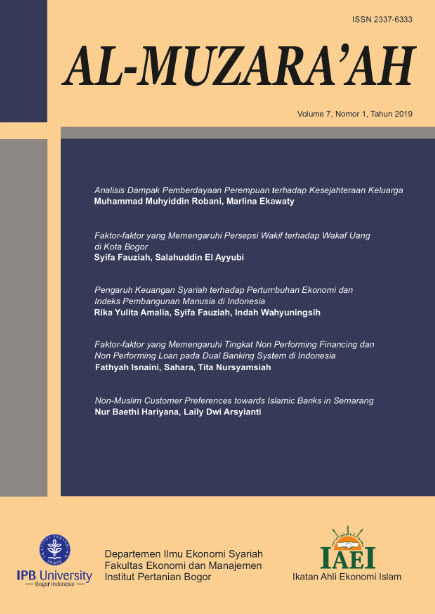Analisis Dampak Pemberdayaan Perempuan terhadap Kesejahteraan Keluarga
Main Article Content
Abstract
This research was conducted to analyze: (1) the form of empowerment carried out by KJKS Ukhuwah Pro-IBU; and (2) the impact of empowerment carried out by KJKS Ukhuwah Pro-IBU. Mix methods with sequential exploratory model was used on this research. The results of the study through interview, observation, and documentaion shows that KJKS Ukhuwah Pro-IBU conducted empowerment through loans and financing with sharia contract, weekly meetings, and training for women groups that were formed. This results shows that the form of empowerment of KJKS Ukhuwah Pro-IBU can be classified as Economic Empowerment and Sharia Grameen. Based on multiple linier regression test, it is known that material welfare of KJKS Ukhuwah Pro-IBU members is positively influenced by financing, length of business, education and negatively by number of family members and age. On the other hand, other factors namely attendance at weekly meetings, Islamic business ethics, has no significant influence. As for the results of Pearson corellation test, it is known that non-material welfare has a relationship with other variables, namely a positive relationship with a moderate degree of closeness with variables of material welfare, financing, Islamic business ethics. This results shows that material or non material welfare improvement one of them can be achieved with women empowerment that using forms of economic empowerment and Sharia Grameen.
Downloads
Article Details

This work is licensed under a Creative Commons Attribution-ShareAlike 4.0 International License.
Author(s) who published in this journal agree to following terms:
- Authors understand and agree that copyright of manuscripts published are held by Al-Muzara'ah. The statement to release the copyright to Al-Muzara'ah is stated in form CTA (link doc).
- Copyright encompass exclusive rights to reproduce, to distribute, and to sell any part of the journal articles in all form and media.
This work is licensed under a Creative Commons Attribution-ShareAlike 4.0 International License (CC BY-SA) where Authors and Readers can copy and redistribute the material in any medium or format, as well as remix, transform, and build upon the material for any purpose, but they must give appropriate credit (cite to the article or content), provide a link to the license, and indicate if changes were made. If you remix, transform, or build upon the material, you must distribute your contributions under the same license as the original.
References
Asmorowati, S. (2007). Dampak pemberian kredit mikro untuk perempuan: Analisis pengadopsian Grameen Bank di Indonesia. Jurnal Masyarakat Kebudayaan dan Politik, 20(3), 175-190.
Daulay, R. (2016). Pengembangan usaha mikro untuk pemberdayaan ekonomi umat islam di kota medan. Miqot Jurnal Ilmu-Ilmu Keislaman, 40(1), 44-65.
Deacon, R. E. & Firebugh, F. M. (1988). Family Resource Management Principle and Applications. Boston (USA), Allyn and Bacon.
Fathullah, H. L & Hoetoro, A. (2016). Pengaruh bantuan zakat produktif oleh lembaga amil zakat terhadap pendapatan mustahik. Jurnal Pemikiran dan Gagasan, 2.
Grameen Bank (2017). Introduction. Diambil dari: http://www.grameen.com/introduction/
Hanna, L. R. (2012). Peranan Koperasi Jasa Keuangan Syariah Perambaburan Al-Qomariyah dalam Memberdayakan Perdagangan Usaha Kecil di Desa Babadan Kecamatan Gunung Jati Kabupaten Cirebon. (Skripsi, IAIN Syekh Nurjati, Cirebon, Indonesia).
Hariyana. (2012). Dampak Program Pemberdayaan Masyarakat Kelurahan (PPMK) terhadap Kesejahteraan Masyarakat di Kelurahan Bukit Duri Kecamatan Tebet Jakarta Selatan. (Skripsi, Universitas Indonesia, Depok, Indonesia).
Hasan, A. (2010). Manajemen Bisnis Syariah. Yogyakarta (ID), Pustaka Pelajar.
Huda, A. (2011). Peran perempuan dalam pemberdayaan ekonomi syariah. Journal de Jure, 5(1), 42-51. http://dx.doi.org/10.18860/j-fsh.v5i1.2995
Hurlock, E. B. (1980). Psikologi Perkembangan: Suatu Pendekatan Sepanjang Rentang Kehidupan. Jakarta (ID), PT Gramedia Pustaka Utama.
Hutomo, M. Y. (2000). Pemberdayaan masyarakat dalam bidang ekonomi: Tinjauan teoritik dan implementasi. Badan Perencanan Pembangunan Nasional Naskah No.20, Juni-Juli 2000.
Karim, A. (2010). Bank Islam: Analisis Fiqih dan Keuangan. Jakarta (ID), PT Raja Grafindo Persada.
Khairani, M. (2017). Analisis peran zakat produktif terhadap perkembangan usaha mikro mustahik: Studi LAZ el-Zawa UIN Maulana Malik Ibrahim Malang. Jurnal Ilmiah Mahasiswa FEB, 5(2).
Lailatussufiani, S. (2016). Pendayagunaan zakat infaq sedekah dalam pemberdayaan masyarakat: Studi Kasus BAZNAS Provinsi Nusa Tenggara Barat. (Tesis, Universitas Brawijaya, Malang, Indonesia). Diambil dari: http://repository.ub.ac.id/155482/
Lukihardianti, A. (2015, 13 Juli). Jumlah Pengusaha UMKM Meningkat. Diambil dari: https://www.republika.co.id/berita/ekonomi/makro/15/07/13/nrfiur-jumlah-pengusaha-umkm-perempuan-meningkat
Maika, A. & Kiswanto, E. (2007). Pemberdayaan perempuan miskin pada usaha kecil di perdesaan melalui layanan lembaga keuangan mikro. Jurnal Populasi, 18(1), 65-84.
Mayoux, L. (1998). Participatory learning for women's empowerment in micofinance programmes negotiating complexity conflict and change. DS Bulletin, 29(4), 39-50.
Mudjib, A. (2011). Kaidah-Kaidah Ilmu Fiqih. Jakarta (ID), Kalam Mulia.
Multifiah. (2009). Pengaruh Zakat Infaq Shadaqah (ZIS) terhadap Kesejahteraan Rumah Tangga Miskin. Malang (ID), Universitas Brawijaya.
Pradana, C. S. (2017). Dampak zakat infaq sedekah terhadap kesejahteraan rumah tangga: Studi pada ElZawa Kota Malang. Jurnal Ilmiah Mahasiswa FEB, 5(2).
Qudsiah, W. L. & Gustiawati, S. (2017). Peranan wanita karir dalam membantu kebutuhan keluarga menurut mazhab Syafi-iyyah. Mizal Journal of Islamic Law, 1(2), 155-172.
Ratnasari, R. (2010). Pola Grameen Syariah untuk Pemberdayaan Ekonomi Masyarakat Berbasis Rumah Tangga: Studi terhadap Program Pendampingan Kelompok Pembiayaan bagi Perempuan Miskin oleh Koperasi Baitul Ikhtiar. (Skripsi, UIN Syariah Hidayatullah, Jakarta, Indonesia). Diambil dari: http://repository.uinjkt.ac.id/dspace/bitstream/123456789/5738/1/ 98738-RATIH%20RATNASARI-FSH.PDF
Samer, S., Majid, I., Rizal, S., Muhamad, M. R., & Rashid, N. (2015). The Impact of microfinance on poverty reduction: Empirical evidence from Malaysian perspective. Procedia-Social and Behavioral Sciences, 721-728.
Sugiyono. (2011). Metode Penelitian Kualitatif dan R&D. Bandung (ID), Alfabeta.
Sugiyono. (2013). Kualitatif dan Kombinasi: Mixed Methods. Bandung (ID), Alfabeta.
Suryawati, C. (2005). Memahami kemiskinan secara multidimensional. Jurnal Manajemen Pelayanan Kesehatan, 8(3), 121-129.
Suradi. (2007). Pembangunan manusia kemiskinan dan kesejahteraan sosial: Kajian tentang kebijakan pembangunan kesejahteraan sosial di Nusa Tenggara Barat. Jurnal Penelitian dan Pengembangan Kesejahteraan Sosial, 12(3), 1-11.
Widyanita (2017). Ketimpangan Indonesia Peringkat 4. Diambil kembali dari: katadata.co.id
World Bank (2018). A Framework for Empowerment: Summary. Diambil dari: http://siteresources.worldbank.org/INTEMPOWERMENT/Resources/486311095970750368/529763-1095971096030/summary.pdf.
Yunus, M. (2008). Menciptakan Dunia Tanpa Kemiskinan. Jakarta (ID), PT Gramedia Pustaka Utama.
Yunus, M. & Jolis, A. (2007). Bank Kaum Miskin. Tangerang (ID), Marjin Kiri.

